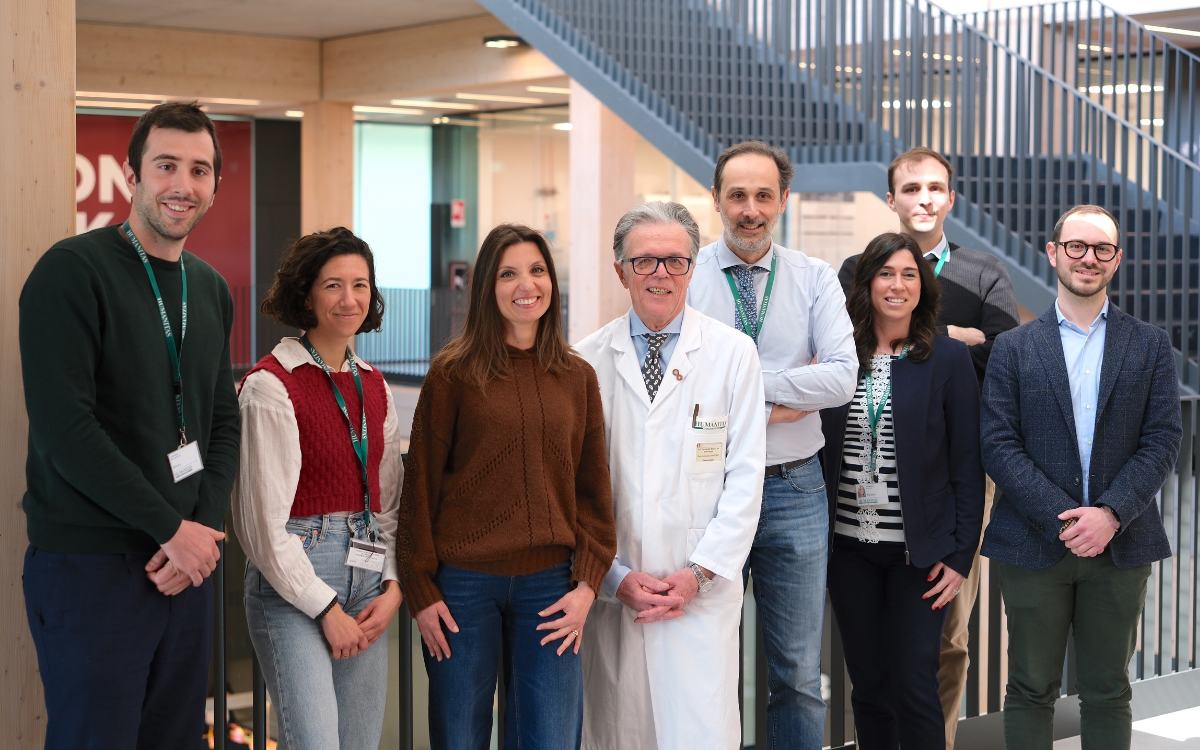Cancer: a “Digital Twin” for every patient

An all-Italian project aims to develop “digital twins” using Artificial Intelligence systems to support clinical decision-making and accelerate cancer research. Humanitas receives funding from the Ministry of University and Research.
Transforming the treatment of rare cancers—and potentially all types of cancer—through the use of digital twins and generative Artificial Intelligence: this is the goal of Humanitas’ Digital Twin project, which has just been awarded €3 million in funding from the FISA program of the Ministry of University and Research.
The Digital Twin project is the result of a partnership between IRCCS Istituto Clinico Humanitas—the first hospital in Italy to establish an AI Center—and Humanitas University.
“This project represents a unique opportunity to enhance our understanding and treatment of rare cancers, which are particularly complex to manage clinically,” says Professor Matteo Della Porta – Head of the Leukemia Unit at IRCCS Istituto Clinico Humanitas and Professor at Humanitas University, who will lead the research.
Rare cancers—defined as those affecting fewer than 6 people per 100,000 annually—account for approximately 25% of all cancer cases.
“The lack of clinical data and the challenges of conducting large-scale studies make these diseases particularly difficult to treat in a standardized way,” Della Porta explains. “Personalized Medicine, based on the analysis of each patient’s specific data, offers a promising strategy to improve diagnosis and care for rare cancers.”
For this reason, rare oncological diseases such as leukemia and myelodysplastic syndromes are the initial focus of the Digital Twin project. However, the broader aim is to develop predictive models of Personalized Medicine that can be applied to other complex human diseases, starting with solid tumors.
Digital Twins: virtual representations for precision medicine
Digital twins are virtual representations of patients, generated by analyzing multimodal data: clinical records, genomic information, medical imaging, treatments, and outcomes. These models enable simulation of disease progression and prediction of treatment responses for each individual, tailoring therapy to their unique characteristics. The accuracy of these simulations depends not only on the algorithms used, but crucially on the quality and completeness of the data incorporated.
The Digital Twin project by Humanitas aims to develop such models to support clinical decision-making and accelerate research through the use of generative AI algorithms. These digital twins allow clinicians to simulate therapeutic scenarios and choose the most appropriate treatment path. The project also includes the development of an “interconnected human digital twin” that integrates data from multiple sources to monitor disease evolution over time.
“Technological innovation is key to offering cancer patients the best possible treatment options,” adds Professor Armando Santoro – Director of the Humanitas Cancer Center. “The Digital Twin project marks a significant step forward in this direction. We are witnessing a revolution that could benefit many cancer patients. Furthermore, digital twins can also accelerate clinical research by reducing the time needed to develop new drugs.”
This approach is made possible only through the integration of diverse expertise. “Artificial Intelligence is not just a tool—it’s a partner that allows us to explore new frontiers in Personalized Medicine,” says Victor Savevski – Chief Innovation Officer and Director of the Humanitas AI Center. “The implications are significant: sparing patients from ineffective treatments and reducing long-term healthcare costs.”
A journey that began years ago to improve leukemia care
The project builds on Humanitas’ expertise and the foundation laid by its AI Center. Since 2021, Professor Della Porta has clinically coordinated the GenoMed4All project, funded by the European Commission under Horizon 2020, which seeks to revolutionize the diagnosis and treatment of hematological diseases using AI. The project involves 23 European partners and has already achieved notable milestones: a model that includes variables such as sex and age to calculate the risk of severe blood diseases; a validated algorithm that predicts the progression of leukemia, paving the way for more targeted therapies; and a system to determine the optimal timing for bone marrow transplants, improving success rates for patients.
Humanitas also participates in the SYNTHEMA, SYNTHIA, and REALISE-D projects within the Horizon Europe and Innovative Health Initiative (IHI) programs. These initiatives aim to develop new technologies to enhance personalized medicine in hematology and speed up clinical trial development.
Artificial Intelligence in medical education
The interdisciplinary experience gained through these projects—featuring collaboration among physicians, engineers, and data scientists—underscores the need for an evolution in university education. With this in mind, Humanitas University, in partnership with Politecnico di Milano, established the MEDTEC School six years ago: a six-year Degree Course in Medicine and Biomedical Engineering, taught entirely in English. This joint program trains professionals capable of applying advanced technologies in the medical field.
In parallel, the partnership with Bocconi University has led to the creation of the Master in Data Analytics and Artificial Intelligence in Health Sciences (DAIHS), a two-year program focused on implementing AI and Machine Learning methods in healthcare.
The program aims to shape professionals with a solid understanding of the healthcare sector and the skills needed to manage and analyze complex data, fostering innovation and efficiency in Life Sciences.
Save the date: 13th April at the Rome Science Festival
From 8th to 13th April, Humanitas will be featured at the Rome Science Festival, held at the Auditorium Parco della Musica Ennio Morricone, with the theme “Bodies.” On Sunday, April 13 at 5:30 PM, Professor Matteo Della Porta will speak with Leonardo De Mattos, Director of the Biomedical Robotics Lab at IIT, and Professor Roberto Verzicco, Fluid Dynamics expert at GSSI and the University of Rome “Tor Vergata,” in a session titled “Virtual Bodies: Avatar Patients and the Future of Clinical Research.”
Also attending the event will be Professor Alberto Mantovani, President of the Humanitas Foundation for Research, and Professor Domenica Lorusso, Head of the Gynecologic Oncology Center at Humanitas San Pio X and Professor at Humanitas University.